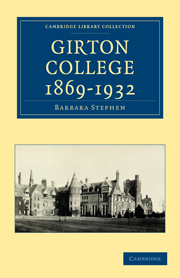Book contents
- Frontmatter
- Contents
- Preface
- Chapter I INTRODUCTION
- Chapter II PRELIMINARY WORK FOR THE COLLEGE
- Chapter III THE COLLEGE IN ITS PIONEER DAYS
- Chapter IV FROM HITCHIN TO GIRTON
- Chapter V GROWTH AND CONSOLIDATION 1875–1903
- Chapter VI A TIME OF TRANSITION 1903–1922
- Chapter VII THE ROYAL COMMISSION AND THE CHARTER
- Chapter VIII THE STATUTES OF 1926, AND THE NEW BUILDINGS
- Chapter IX VARIOUS MATTERS
- Biographical Index
- Index
- Plate section
Chapter V - GROWTH AND CONSOLIDATION 1875–1903
Published online by Cambridge University Press: 05 July 2011
- Frontmatter
- Contents
- Preface
- Chapter I INTRODUCTION
- Chapter II PRELIMINARY WORK FOR THE COLLEGE
- Chapter III THE COLLEGE IN ITS PIONEER DAYS
- Chapter IV FROM HITCHIN TO GIRTON
- Chapter V GROWTH AND CONSOLIDATION 1875–1903
- Chapter VI A TIME OF TRANSITION 1903–1922
- Chapter VII THE ROYAL COMMISSION AND THE CHARTER
- Chapter VIII THE STATUTES OF 1926, AND THE NEW BUILDINGS
- Chapter IX VARIOUS MATTERS
- Biographical Index
- Index
- Plate section
Summary
The Mistress-ship. Miss Bernard (1875–85). The Graces of 1881. Differences of policy between Girton and Newnham. Growth of buildings at Girton. Miss Welsh's Mistress-ship (1885–1903). Miss Jones appointed Mistress.
The College had now been in existence for six years, and during that time had had no less than four Mistresses. The position of the Mistress and her relations to the students and to the Executive Committee had not been clearly established, and the problems involved had become obscured by Miss Davies's tenure of the two offices of Secretary and Mistress. It was urgently necessary that the whole subject should be thoroughly considered and placed on a stable footing. The Committee, after reviewing the situation, defined the position of the Mistress in such a way as to make her of paramount importance as regards the internal management of the College, while herself remaining outside the governing body. She was to be responsible for all educational arrangements, as well as for discipline and domestic administration. The resident lecturers were to be appointed by the Committee on her nomination. The post was one involving a variety of work and much attention to detail. The duties shared to-day among the Directors of Studies, the Junior Bursar, the Librarian, and other officials were then all performed by the Mistress.
These matters having been settled, the post was advertised, and on June 28th, 1875, Miss M. F. Bernard was appointed.
- Type
- Chapter
- Information
- Girton College 1869–1932 , pp. 70 - 85Publisher: Cambridge University PressPrint publication year: 2010First published in: 1933



